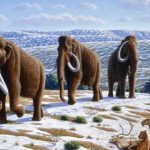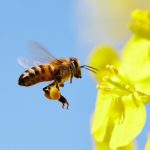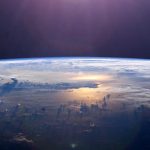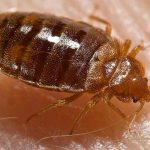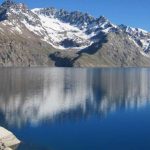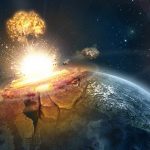Male mammoths — much like male humans — were clumsy galoots who didn’t look where they walking and fell into holes, researchers have established. Scientists led by Love Dalen of the Swedish Museum of Natural History in Stockholm set out to determine the gender of 98 sets of mammoth remains collected from various parts of Siberia. Unexpectedly, they found that ... Read More »
Science
Bees can be left or right-handed like humans, says new research
Scientists at The University of Queensland’s Queensland Brain Institute have discovered that bees can have a preference for left or right – influencing their decisions while they navigate obstacles in flight. Professor Mandyam (Srini) Srinivasan said the study showed that honeybees displayed handedness that varied from individual to individual. “Unlike humans, who are mostly right-handed, some bees display a strong ... Read More »
Scientists discover belt of dust surrounding nearest star
Scientists have detected at least one cold dust belt surrounding the closest star to the Sun, Proxima Centauri. The presence of such a feature suggests there might be more than one planet orbiting Proxima. Proxima Centauri is the closest star to the Sun. It is a faint red dwarf lying just four light-years away in the southern constellation of Centaurus ... Read More »
Research reveals women more likely to file for divorce than men
When it comes to marriage, men are more likely to experience tension that builds over time, starting out low and increasing with the years – but, women are more likely to pull the plug. The research, which followed 355 couples over the course of 16 years, found that while wives’ and husbands’ marital tension increased over time, husbands’ tensions increased ... Read More »
Laika the Cosmonaut Dog: USSR sends first living creature into orbit
It was a Space Race victory that would have broken Sarah McLachlan’s heart. On this day, Nov. 3, in 1957, the Soviet Union launched the first-ever living animal into orbit: a dog named Laika. The flight was meant to test the safety of space travel for humans, but it was a guaranteed suicide mission for the dog, since technology hadn’t advanced ... Read More »
NASA: Earth’s ozone hole shrivels to smallest since 1988
Measurements from satellites this year showed the hole in Earth’s ozone layer that forms over Antarctica each September was the smallest observed since 1988, scientists from NASA and NOAA announced today. According to NASA, the ozone hole reached its peak extent on Sept. 11, covering an area about two and a half times the size of the United States – ... Read More »
Anthropologists identify third new orangutan species in Indonesia
Sumatra A new species of orangutan has been identified, and at the same time classified as one of the planet’s most endangered great apes. With only around 800 remaining individuals occuring in upland forest regions of North Sumatra. Two species of Indonesian orangutans had previously been officially described and recognized – the Pongo abelii, living on the island of Sumatra, and ... Read More »
Human brain not as exceptional as thought, says new research
While it has been long assumed that humans commit more energy to powering their brains than other animals, researchers have now determined this is not the case. It turns out that some animals, such as the tiny pygmy marmoset, dedicate just as much energy to their brains as people do. Published in the Journal of Human Evolution, Doug Boyer and ... Read More »
Research: Are cities affecting evolution?
The recent uproar about seats on a British Airways flight crawling with bedbugs is only one of the unintended consequences that urbanization worldwide has on evolution, say Marc Johnson, an associate professor of biology at the University of Toronto Mississauga, and Jason Munshi-South, who is an associate professor of biological sciences at Fordham University. “As we build cities, we have ... Read More »
Climate Change Could Decrease Sun’s Ability To Disinfect Lakes (Research)
A new research published in journal Scientific Reports has revealed another harmful effect of climate change. Increasing organic runoff as a result of climate change may be reducing the penetration of pathogen-killing ultraviolet (UV) sunlight in inland lakes, rivers, and coastal waters, according to a new study in the journal Scientific Reports. The findings, from a team including researchers at Rensselaer Polytechnic ... Read More »
Dinosaur-killing asteroid cooled Earth more than thought, scientists say
The Chicxulub asteroid impact that many believed wiped out the dinosaurs released far more climate-altering gas into the atmosphere than originally thought, researchers have revealed. It reveals for the first time how much sulfur and carbon dioxide gas was ejected into Earth’s atmosphere from vaporized rocks immediately after the event – triggering a ‘superwinter’. “Many climate models can’t currently capture ... Read More »
 Canada Journal – News of the World Articles and videos to bring you the biggest Canadian news stories from across the country every day
Canada Journal – News of the World Articles and videos to bring you the biggest Canadian news stories from across the country every day
